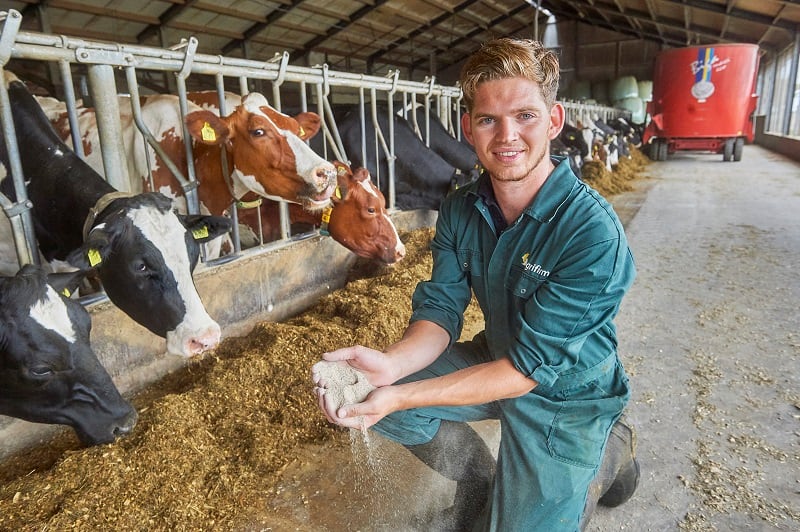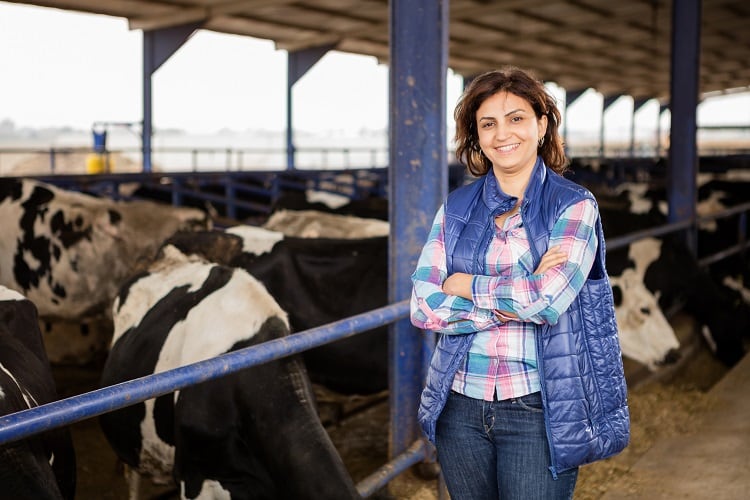One exciting innovation is the use of feed additives which modify conditions in the cows’ rumen and reduce the generation of methane as cows digest their food.
Consequently, Dutch dairy company Royal FrieslandCampina, bioscience multinational Royal DSM, and feed supplier Agrifirm have revealed the results of what they call the world’s first large-scale on-farm use of the methane-reducing feed additive for cattle.
The project between the companies saw DSM’s feed additive called Bovaer incorporated into the regular farming activities of 158 dairy farms in the Netherlands. The six-month programme, which started in 2022, confirmed that the feed additive was easily introduced at scale without affecting animal health, milk production or milk composition.
The project, which involved more than 20,000 cows, led to a decrease of 10,000 tonnes of CO2e in methane emissions (an average of 28% less enteric methane emissions), the companies claimed. They added the move could therefore assist the Netherlands to reach its climate targets and benefit consumers and farmers alike.
Mark van Nieuwland, VP Bovaer DSM, said: “We are delighted with the positive feedback from the dairy farmers involved in this large-scale pilot project in the Netherlands, which has confirmed the potential of our innovative Bovaer feed additive. We look forward to continuing our partnership with FrieslandCampina and Agrifirm to ensure Bovaer reaches more cows and makes an even greater contribution to tackling agricultural methane emissions. With these developments we also play a key role in supporting the near-term climate goals of the Global Methane Pledge, signed by more than 150 countries including the Netherlands.”
The cost barrier
DSM, which spent 10 years researching and developing it, claims that just a quarter teaspoon of the additive per cow per day consistently reduces enteric methane emission by approximately 30% for dairy cows and even higher percentages (up till 90%) for beef cows. Implementing Bovaer via the mineral feed or mash feed, meanwhile, is very easy for the farmer and requires no new skills or farm practices, according to DSM. Cost, however, is one barrier that may limit the widespread uptake of this feed additive. Upon feeding, it takes effect immediately and costs around 1 cent per litre of milk extra.
"As with many sustainability measures Bovaer comes at a cost and the question of who pays for it is a key question that will have to be addressed to move to large-scale use and impact," Mark van Nieuwland, VP Bovaer at DSM, told FoodNavigator. He hinted that more needs to be done to incentivise farmers. "There’s a great drive among farmers to farm more sustainability but they should not be the ones bearing the cost," he said. "It’s critical that all parties in the value chain feed suppliers, dairy/beef processors, supermarkets, hospitality sector and the consumer, contribute to reducing the environmental impact of food production.
"We do also see in a number of countries that the government plays a role in incentivizing early adopters by compensating part of the costs of feed additives and/or methane reduction measures. In the EU, Flanders and Slovenia have put in place eco-schemes as part of their CAP National Strategic Plans to support farmers in using methane-reducing feed measures. In other markets dairy companies and retailers absorb the costs and pass these on to their customers and consumers."
Lars van den Nieuwenhof owns a farm with 125 dairy cows in Someren, North Brabant. He participated in FrieslandCampina's pilot to reduce greenhouse gases on his farm with Bovaer. Lars said: "As an industry, we are at a tipping point. We have to move along and try to reduce methane emissions. We were therefore eager to participate in this pilot. Moreover, participation is low-threshold and it requires little effort. The Bovaer is mixed into the minerals we feed to the cows. Every day we mix the minimum dose of 150 grams of those minerals through the ration. We also participated in workshops to exchange experiences with other participants. I am definitely satisfied with the results. The cows are producing well, are healthy, vital and fertile. We will continue to use the feed additive. I am happy that we can make an additional contribution to reducing our impact on the climate."





